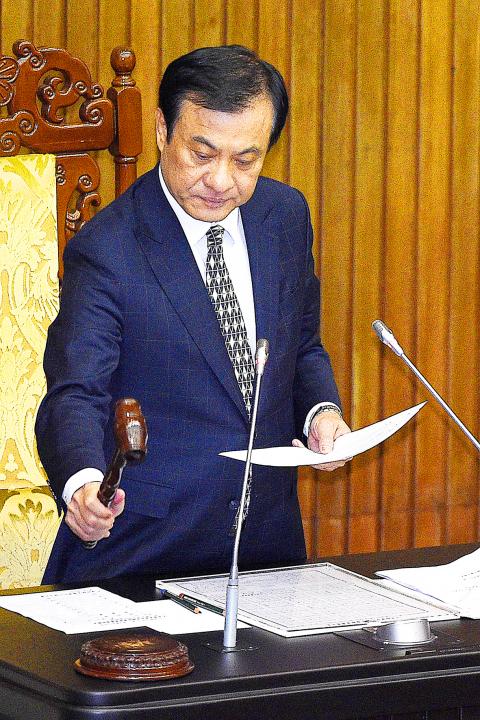The Legislative Yuan yesterday passed the Ocean Basic Act (海洋基本法), which aims to make Taiwan a marine nation that strives toward ensuring sustainable use of the sea and its resources, as well as a facilitator of collaboration on international marine affairs.
The act stipulates that the central government should publish a white paper on ocean policy and marine pollution control within one year of the law’s enactment, and revise it regularly based on its results, and domestic and international developments.
Government agencies at all levels should review their marine policies based on the white paper and correct any action that contradicts the central government’s policy, the act says.

Photo: Chen Chih-chu, Taipei Times
The government should educate the public about the ocean and make information on the ocean more accessible; build a marine industry with high added value; ensure sustainability in marine ecology and resources by promoting environmental friendly measures; and engage in exchanges in international marine affairs, it says.
The government should guarantee and protect the “marine rights” of citizens of all ages and ethnicities, the act says.
The government should allocate and make good use of domestic resources to form policies to tackle marine pollution at its sources, thereby facilitating the nation’s efforts to combat pollution, it says.
It should approach the planning of land utilization in a way that is prudent and conducive to mitigating marine disasters, as well as pushing marine remediation efforts, the act stipulates.
Pending the president’s signature, the act also designates June 8 as National Oceans Day to coincide with a resolution carried by the 1992 UN Conference on Environment and Development proclaiming the day as World Oceans Day to raise public awareness of marine conservation.
The government is responsible for streamlining the efforts of relevant agencies on marine affairs and the formulation of regulations on utilization of the marine resources, and must seek to achieve balance between the nation’s operations and the challenges it faces at sea, the act stipulates.
The government should engage in international collaborations on protecting, developing and sharing marine resources in a manner that is sustainable, mutually beneficial, and respects history and the nation’s sovereignty, it says.
The government should be generous in planning a “marine budget” and take any measure necessary to ensure that the budget is sufficient to cover relevant policies, the act stipulates.
To uphold and advance the nation’s marine rights; ensure national and maritime security; and respond to major contingencies; the government should plan strategically and handle marine affairs with a global perspective, as well as redouble efforts when handling marine issues, thereby boosting the nation’s maritime power, it says.
The nation should foster the marine industry by introducing policies, including financial and taxation benefits, and cultivating talent, the act says.

Right-wing political scientist Laura Fernandez on Sunday won Costa Rica’s presidential election by a landslide, after promising to crack down on rising violence linked to the cocaine trade. Fernandez’s nearest rival, economist Alvaro Ramos, conceded defeat as results showed the ruling party far exceeding the threshold of 40 percent needed to avoid a runoff. With 94 percent of polling stations counted, the political heir of outgoing Costa Rican President Rodrigo Chaves had captured 48.3 percent of the vote compared with Ramos’ 33.4 percent, the Supreme Electoral Tribunal said. As soon as the first results were announced, members of Fernandez’s Sovereign People’s Party

MORE RESPONSIBILITY: Draftees would be expected to fight alongside professional soldiers, likely requiring the transformation of some training brigades into combat units The armed forces are to start incorporating new conscripts into combined arms brigades this year to enhance combat readiness, the Executive Yuan’s latest policy report said. The new policy would affect Taiwanese men entering the military for their compulsory service, which was extended to one year under reforms by then-president Tsai Ing-wen (蔡英文) in 2022. The conscripts would be trained to operate machine guns, uncrewed aerial vehicles, anti-tank guided missile launchers and Stinger air defense systems, the report said, adding that the basic training would be lengthened to eight weeks. After basic training, conscripts would be sorted into infantry battalions that would take

GROWING AMBITIONS: The scale and tempo of the operations show that the Strait has become the core theater for China to expand its security interests, the report said Chinese military aircraft incursions around Taiwan have surged nearly 15-fold over the past five years, according to a report released yesterday by the Democratic Progressive Party’s (DPP) Department of China Affairs. Sorties in the Taiwan Strait were previously irregular, totaling 380 in 2020, but have since evolved into routine operations, the report showed. “This demonstrates that the Taiwan Strait has become both the starting point and testing ground for Beijing’s expansionist ambitions,” it said. Driven by military expansionism, China is systematically pursuing actions aimed at altering the regional “status quo,” the department said, adding that Taiwan represents the most critical link in China’s

EMERGING FIELDS: The Chinese president said that the two countries would explore cooperation in green technology, the digital economy and artificial intelligence Chinese President Xi Jinping (習近平) yesterday called for an “equal and orderly multipolar world” in the face of “unilateral bullying,” in an apparent jab at the US. Xi was speaking during talks in Beijing with Uruguayan President Yamandu Orsi, the first South American leader to visit China since US special forces captured then-Venezuelan president Nicolas Maduro last month — an operation that Beijing condemned as a violation of sovereignty. Orsi follows a slew of leaders to have visited China seeking to boost ties with the world’s second-largest economy to hedge against US President Donald Trump’s increasingly unpredictable administration. “The international situation is fraught